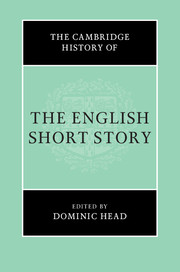Two members of the Department of Comparative Literature have just been published in the new collection The Cambridge History of the English Short Story (Cambridge University Press, 2016), edited by Dominic Head from the University of Nottingham.
Both Dr Axel Stähler, Reader in Comparative Literature, and Dr Paul March-Russell, Specialist Associate Lecturer in Comparative Literature, have contributed chapters. The collection is the first comprehensive volume to chart the origins and evolution of the English short story to the present day. Written by international experts in the field, it covers numerous transnational and historical connections between writers, modes and forms of transmission.
Axel’s chapter, entitled ‘Stories of Jewish Identity: Survivors, Exiles and Cosmopolitans’ focuses on the British Jewish short story in English, which in the past has suffered a surprising lack of recognition. There is, to date, no comprehensive anthology, though there have been various attempts in the Anglophone world at anthologising Jewish short stories. In order to gain a sense of the development of the British Jewish short story and its place in the larger context of English (or perhaps better Anglophone) and Jewish literature, the chapter therefore explores its manifestation in some such collections which are, after all, dedicated to categorization and, at least implicitly, to the negotiation of a canon.
Seen in a comparative historical perspective, these anthologies chart shifts in the approach to Jewish secular writing pre- and post-Holocaust, from its emergence in the mid-nineteenth century to (almost) the present day. As such they suggest a trajectory of the global evolution of the Jewish short story while simultaneously indicating, more specifically, patterns of the perception of British Jewish short stories in changing contexts. The chapter proposes to distinguish between two putative phases of anthologising British Jewish short stories in the Anglophone world which negotiate between these parameters.
The chapter by Paul March-Russell is entitled ‘Frontiers: Science Fiction and the British Marketplace’. Not only does the short story lie at the intersection between high and low culture, between the little magazine and the mass-market periodical, as Tim Armstrong has observed, but so too does science fiction. As Farah Mendlesohn has argued, ‘whatever else it is, sf literature is not popular’; it exists ‘at variance from the standards and demands of both the literary establishment and the mass market’. Science fiction and the short story complement each other not only formally but also culturally: their liminal position questions the assumptions by which critics have often discriminated between what is or is not literary. Yet, as Nicola Humble has noted, ‘there is something wrong with the way in which we have mapped the literary field of the first half of the twentieth century’. This ‘something wrong’ is accentuated when we attempt to re-map not only the short story but also science fiction as part of literary production since the 1890s.
For more details, please see the publisher’s website: www.cambridge.org/gb/academic/subjects/literature/english-literature-general-interest/cambridge-history-english-short-story?format=HB

